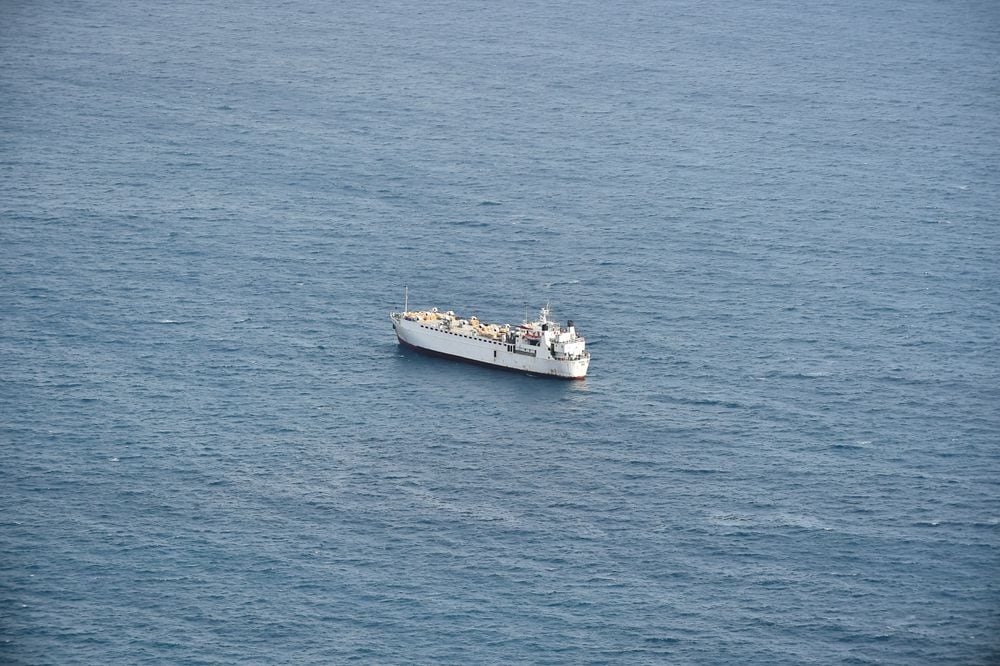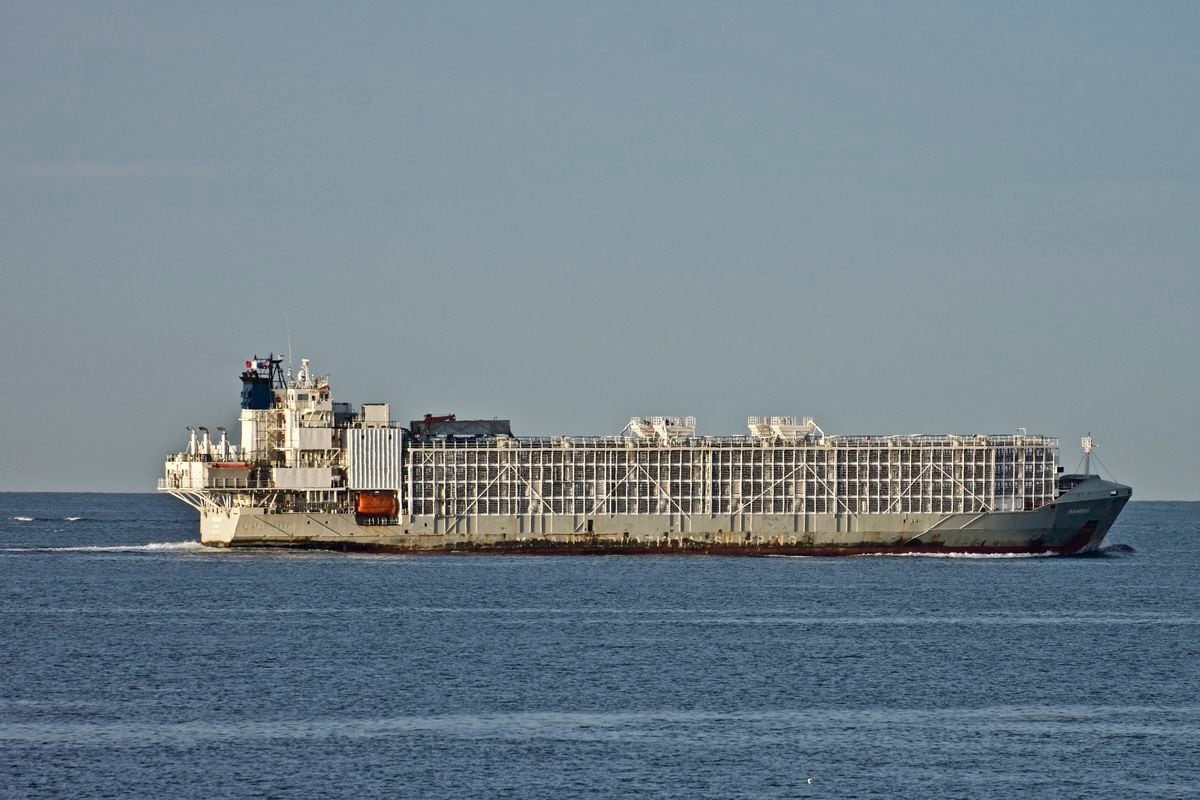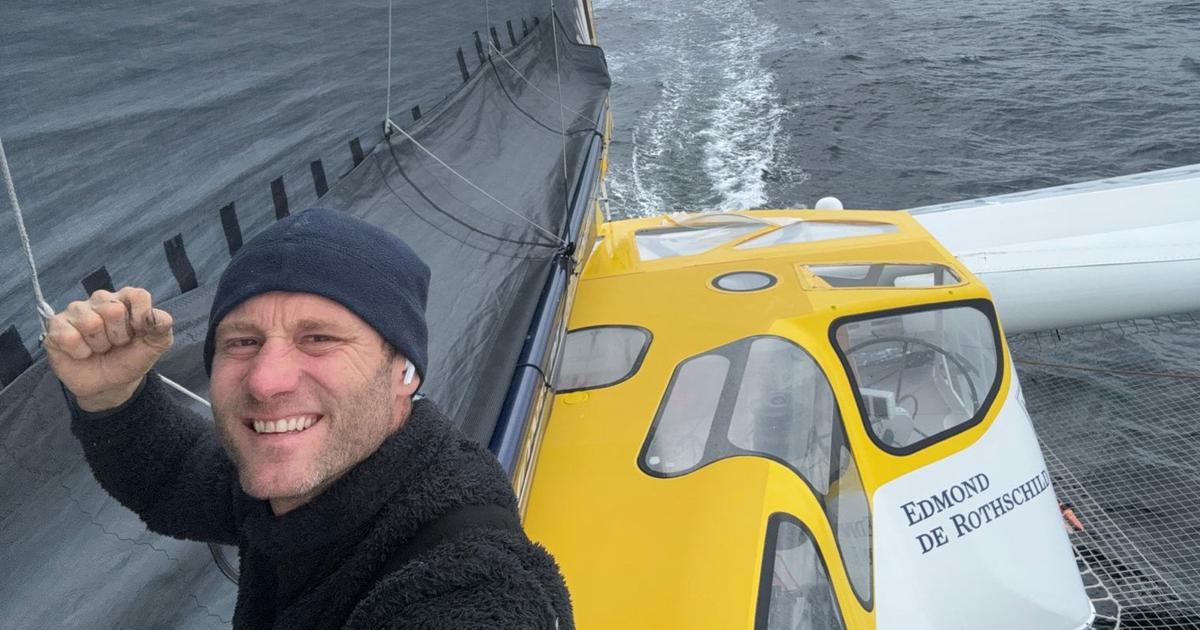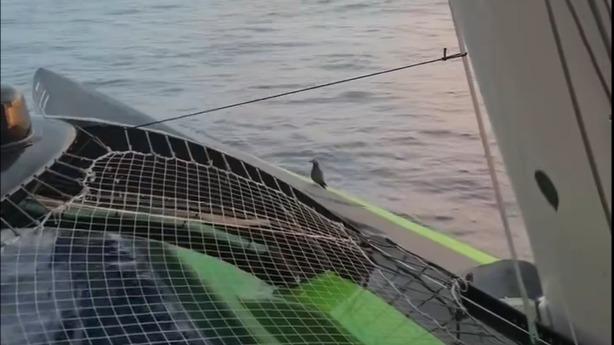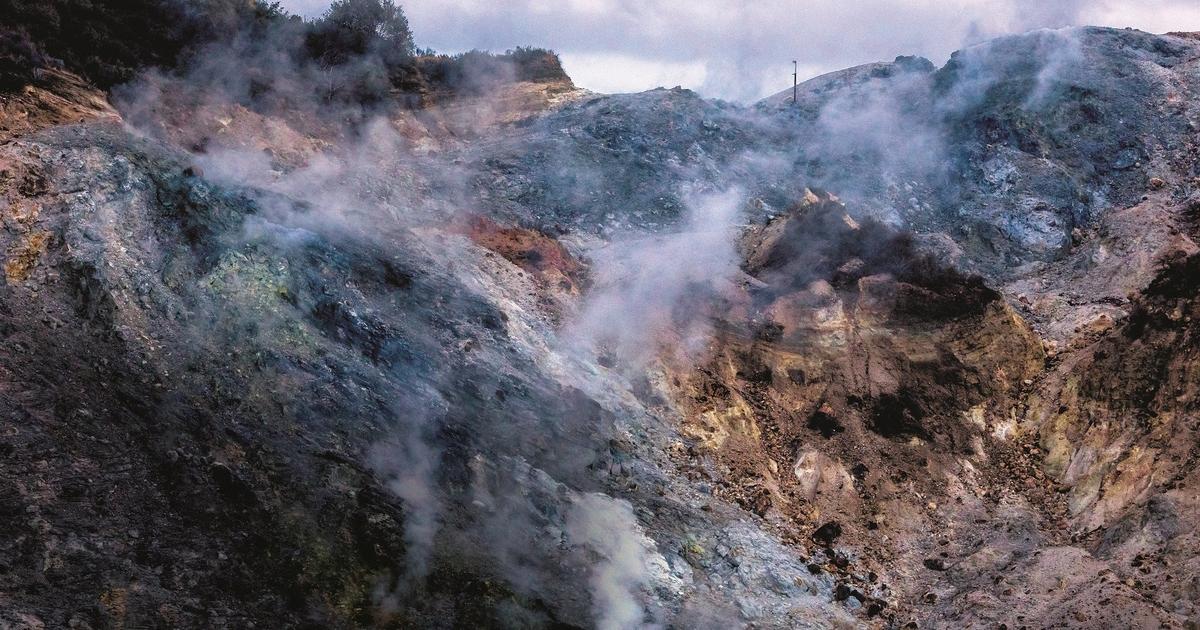The almost 900 calves transported by the ship
Karim Allah
left the port of Cartagena on December 18 to be sold in Turkey as bait cattle, but they will end up slaughtered back in Spain after a cruel journey through the sea of bureaucracy.
In between, the animals spent more than two months roaming the Mediterranean inside the old Lebanese-flagged freighter, an odyssey in which at least 22 cattle have already died, butchered and thrown into the water.
This Saturday morning the landing and slaughter of the rest of the cows began.
A boat loaded with 900 cows that nobody wants returns to Cartagena after two months at sea
The sanitary inspectors recommend the slaughter of the cows of the ship docked in Cartagena
The Superior Court of Justice of Madrid rejected on Friday the appeal that requested the precautionary suspension of the order to sacrifice them.
The journey for the animals is now coming to an end.
In the same port of Escombreras, a tent has been set up next to the ship to kill them and remove the corpses in containers for disposal, without really knowing if they are infected with bluetongue, a non-contagious viral disease that affects ruminants. .
"I can't explain it," says Nabil Mohamad, the Syrian-born captain of the
Karim Allah
.
"I've been in this for 25 years and nothing like this has ever happened to me," he says.
"I don't understand anything, it has been very hard."
The nightmare began when they arrived at the port of Iskenderun, when the Turkish authorities rejected the merchandise, considering that the documentation did not make it clear that the 895 cattle were free of bluetongue disease.
The Spanish Ministry of Agriculture has ensured that "at the time of its departure, the transport was covered by the certification of the Spanish veterinary authorities, which guarantees the good health of the animals."
However, according to the version of Miguel Masramon, lawyer for the ship's owner (Talia Shipping Line), there was a “mess” with the health certificates: “The certificates showed that the origin of the animals is Aragon and that it is a free zone blue tongue.
But the ministry had notified the OIE in November that there was a bluetongue outbreak in a farm in Huesca (Aragon).
In the certificate of origin that Turkey receives it said 'Aragon', and in the ministry's report to the OIE it also said 'Aragon'.
When Turkey receives the health certificates for the operation, "they see that the origin of the cattle is Aragon and, having no more information, they reject the merchandise."
Luis Fernández, administrator of Ganados Ferru, one of the companies that owns the animals, confirms that “none of the calves left Huesca”.
"In the certificates and the notification from the ministry, it should have been specified that the calves were from Zaragoza and Teruel," he says.
Finally, the ship leaves Turkey on December 31.
According to the shipowner's lawyer, without the Turkish authorities examining the health of the cattle.
"It was proposed to Turkey that they do PCR tests to confirm that they were healthy, but the Turkish authorities declined the offer," says Matilde Moro, manager of the Spanish Association of Beef Beef Producers.
The captain then received the order to set sail for Libya to try to sell the cattle there, beginning the odyssey of the cattle through the Mediterranean.
In the port of Tripoli, after having taken blood samples from the calves, the Libyan authorities inform the ship that the animals cannot be unloaded because they do not comply with the blue tongue regulations.
"We deduced that they were tested for bluetongue antibodies and that some [of the animals] were positive," says Masramon.
"In Spain it is very common to vaccinate calves to prevent them from catching blue tongue."
According to the lawyer, that is why some of the calves would have tested positive.
Luis Fernández explains that “almost all” the calves had been vaccinated against bluetongue in their farms where they were born and that before being exported, they are subjected to PCR tests.
The Libyan authorities did not disclose the result of the blood tests.
On January 9, the captain of the
Karim Allah
removes the vessel with the calves from Tripoli, under threat of imprisonment if it does not leave the African port.
If Libya's purchase failed, the World Trade exporter "ignores it," says Masramon, and the ship is left to its own devices.
Near the coast of Tunisia, the freighter requests permission to enter the port of Bizerte in order to stock up on fodder for livestock.
This is what the Tunisian newspaper La Presse tells it on January 23, which reports that the
Karim Allah
is forced to leave the territorial waters of Tunisia and is prohibited from docking in any commercial port in the country.
According to Youssef Ben Romdhane, general director of Maritime Transport and Ports, the ship is carrying cattle suspected of being infected with the disease of the blue tongue, although “at the moment there is no document that proves the veracity of this information ”.
Converted into a plagued ship that nobody wants, the animals spend more than three days without food, only on water, until, finally, the freighter gets fodder to feed them in the port of Augusta, in Sicily.
After two and a half months,
Karim Allah
returns
to Cartagena on February 22, but the bad dream has not ended: the authorities here prohibit him from entering Spanish territory.
If it did, they consider that the cattle would be imported from Libya, the last country where they were tried to sell.
And Libya is prohibited from exporting live animals to the European Union due to the existence of foot-and-mouth disease on its territory.
Therefore, Spain does not accept the entry of animals.
The Ministry of Agriculture also relies on another law that establishes that any product that the European Union exports to a third country and is rejected has only two outlets: either be sold to another non-EU country or destroyed in the place of origin.
So if the
Karim Allah
entered the port, the cattle would be isolated and slaughtered.
To avoid this, the captain anchors abroad and the shipowner hires independent veterinarians from the Offshore Special Services (OSS) company, who take 39 blood samples from the cattle.
However, these samples were sealed by the Cartagena Customs department at noon on February 25, before they could be sent to the laboratory.
Despite this, OSS veterinarians maintain that the animals "do not show clinical signs consistent with bluetongue."
That same afternoon and at the request of the ministry, the captain docks at the Escombreras dock for the Animal Health veterinarians to inspect the animals.
According to the captain, they did not take any blood samples.
Indeed, the veterinary inspection report is based only on a visual inspection that concludes that the calves have skin conditions and digestive disorders.
The document counts 864 calves and records the unknown whereabouts of nine cattle, apart from the 22 that the captain admits died during the trip.
But the minutes do not mention foot-and-mouth disease or blue tongue.
However, the ministry informs the shipowner that the animals must be slaughtered because they are not suitable for transport and cannot be imported.
For Masramon, the shipowner's lawyer, it is a “colossal nonsense”.
However, this order is endorsed by the Superior Court of Justice of Madrid, which applies the precautionary principle and the prevalence of general interests.
Animal transport
Karim Allah's
69-day odyssey from
port to port across the Mediterranean has raised doubts about the guarantees of animal welfare on these types of trips.
The European Union regulates the transport of live animals through the European Council regulation on the protection of animals during transport.
But from organizations like Animal Equality they affirm that these norms are not fulfilled.
"Once they leave the port, there is no way to control it," says Silvia Barquero, president of this entity.
In the case of the
Karim Allah
, although the 18 crew members monitored the status of the cattle, as confirmed by the captain, there were no veterinarians on board.
Boatman also points out that the
Karim Allah,
an old ship from 1956, was not built to transport livestock.
“Yes, it used to be a vehicle freighter,” says the captain, “but now it has cattle and complies with the regulations.
It has the certificate to do it until 2022 ”.
Specifically, the vessel was conditioned for the transport of livestock in 2001. In addition, the inspection of the veterinarians of Animal Health considered that the cleanliness of the
Karim Allah
is "adequate" and did not observe overcrowded conditions.
However, given the consequences of this bureaucratic mess, animal organizations are demanding a change in the legislation relating to the transport of livestock.
From Animal Equality they urge the Government of Spain to follow the example of other European countries and "prohibit the transport of live animals outside the European Union."
For the Animalista Party – PACMA, the operation is a “sample of the cruelty of the cattle industry and the complicity of the administrations”.
For this reason, it has presented proposals to the Government for the modification of the Royal Decree that regulates the transport of live animals.
"The tragedy of these animals illustrates that this type of trade is poorly controlled and that animals are victims of arbitrariness and errors," they denounce from the Animal Welfare Foundation.
For the organization, the case of
Karim Allah
is “a clear example of the lack of immediate and effective reaction on the part of the competent Spanish authorities”, which “have been slow to react for more than two months and have only reacted clearly due to the high pressure Social".
To know the most important news on Climate and Environment of EL PAÍS, sign up here for our
weekly
newsletter
.
Follow the Climate and Environment section on
and

